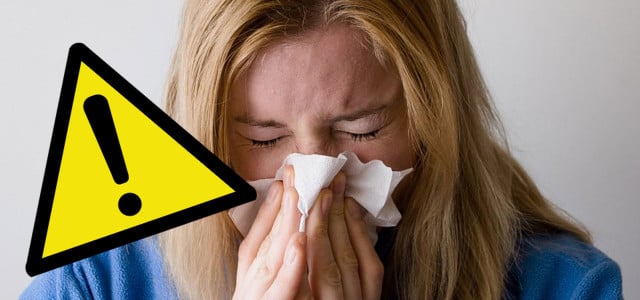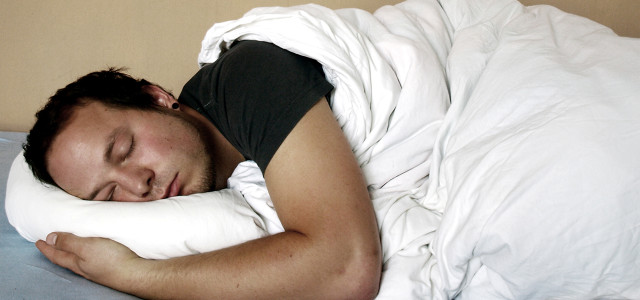
The nose is running, the throat is scratching and the head is hurting: almost everyone catches a cold in the cold season. There are many home remedies that will help get rid of them quickly – but there are also some that have the opposite effect. If your cold gets better and worse again, you should avoid the following mistakes.
A simple cold is relatively harmless, but if you are careless or don’t treat it properly, you risk spending the whole fall or winter with a runny nose or procrastinating the disease. To get rid of them quickly, you should definitely avoid these nine mistakes when you have a cold:
1. Using the nasal spray incorrectly
Nasal spray gives you quick relief from a stuffy nose – but you should be careful and not use the spray too often or for a long time. Once your mucous membranes have gotten used to the active ingredients, it can happen that the nasal mucous membranes swell even more.
If you then continue to use nasal spray, you risk chronic colds. The irritated nasal mucous membranes can dry out and no longer fulfill their defense function – which in turn clears the way for germs. You should therefore use nasal sprays for a week at most. Even better: Use homemade nasal spray to get rid of a cold quickly.
2. Mistakes with colds: blow your nose hard and pull up nasal mucus
A runny nose is uncomfortable, as is constant sniffling and sniffling. But somehow you have to get rid of the nasal mucus. Blowing your nose hard isn’t helpful, however, as it can cause mucus to get into your sinuses. In the worst case, the germs that are spread in this way can cause a sinus infection.
Pulling up the nasal mucus instead and swallowing it down the throat happens again and again because the secretion also drains naturally into the throat, but conscious swallowing is not optimal. Because: The infectious secretion can possibly trigger a throat or throat infection. Better: Dab off the nasal secretion or blow your nose with little pressure.
3. Staying in bed to get rid of the cold quickly

Anyone who has a cold often feels listless and tired – and therefore prefers to crawl into bed. This helps the body with a simple cold but only to a limited extent. It is better to wrap up warm and go for a walk in between. This is good for the circulation and the irritated nasal mucous membranes. But it is important to note that this does not apply to fever – bed rest is necessary and appropriate.
4th common cold mistake: suppress a sneeze
Sneezing is loud, unappetizing – and therefore uncomfortable in public. But we are not equipped with the sneeze reflex for fun. It ensures that the nose is freed from foreign bodies such as dust, viruses and bacteria. If you suppress the sneeze, the pressure that is supposed to eject the foreign body from the body is directed inwards.
This can cause overpressure in the ear, which is uncomfortable. What you should still pay attention to when sneezing: do not sneeze into your palms, but into the crook of your arm. In this way you protect your fellow human beings from viruses and bacteria flying around or a contaminated handshake. This is more important than ever, especially in times of the corona pandemic.
5. Exercising too early in sports
If you have a cold, you should go for a walk, wrapped up warm, but not exercise excessively. Above all, exhausting endurance sports put additional strain on the body in the event of a viral infection: When you have a cold, the immune system works harder than usual to fight the pathogens. The exertion of sport is another stressor. If our immune system uses up its reserves for this, it can do less against the pathogens. The same applies to bacterial infections.
Note: Whether or not sport should be avoided entirely in the event of an infection, opinions differ among doctors, too. There is currently not enough reliable evidence-based research on the subject. However, if you want to be sure, you can listen to the assessment of some experts. This is: In the case of a flu infection, sport can cause the pathogens to attack the heart and cause myocarditis – and this can sometimes even be life-threatening.
Important: Sport with a fever is an absolute taboo. In any case, peace is required here.

If you have a mild cold, you can resume exercise as soon as the symptoms subside. After feverish infections, you should take a break for at least a week. Listen to your body, slowly get back into it and only do as much exercise as is good for you. Also read: Exercise when you have a cold – you should know that
People with a chronic illness or an immune deficiency should be particularly careful. Medical advice should be sought urgently as to when it is advisable to start exercising – and to what extent. We also recommend that you consult your general practitioner.
6. Treat cold with antibiotics
Antibiotics are only effective against bacterial infections, but the majority of colds are viral infections. Here they are of no use, in fact they are harmful: because the more antibiotics are used, the greater the risk that bacteria will become resistant to the drugs. Natural antibiotics in the form of medicinal plants are better.
7. Sweat out cold
If you want to get rid of a cold quickly, sit in a hot bath, then wrap up warm and go to bed with a hot water bottle. On the other hand, it is not a good idea to try to sweat out a cold in the sauna. The hot air puts additional strain on the already weak circulation. A visit to the sauna also encourages germs to multiply better. If you have a cold, you should avoid the sauna.
Also interesting: Does freezing make you sick or does it harden you?
8. Common cold mistake: going to work
A cold usually doesn’t tie you to bed straight away. Nevertheless, it makes sense to stay at home for the first two to three days of an infection – during this time the risk of infection with a cold is greatest. If the symptoms subside, you can go back to work. However, it is advisable to keep some distance from colleagues, friends and family members until all complaints are over.
During the corona pandemic, the following still applies: Anyone who feels typical symptoms should stay at home, limit contacts and get medical help by phone. You can find more information on the information page of the Federal Center for Health Education.
By the way: Drink a hot lemon …
…doesn’t make your cold worse because lemons are high in vitamin C, and eating them regularly can help relieve symptoms and shorten the duration of a cold. Hot lemon is therefore often praised as a tried-and-tested home remedy – although its effect as a home remedy is more likely to be attributed to fluid intake (a lot of drinking!). You should also note that vitamin C is heat sensitive. It gets lost in hot water. So instead of mixing lemon juice with boiling water, use lukewarm water. A temperature of 40 degrees Celsius is ideal.
Note: An earlier version of the article stated that warm milk with honey promotes mucus formation. This information was wrong. We have changed the article accordingly.
Read more on Techzle.com:
- 6 herbal home remedies for colds
- Turmeric (curcumin), the Indian spice with medicinal properties
- strengthen your immune system: 10 natural tips for better defenses